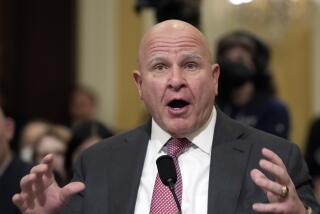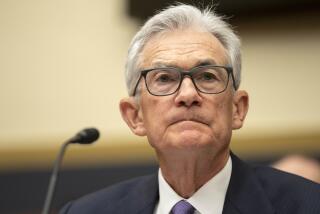Powell Lashes at Gulf Policy Critics : Mideast crisis: The Joint Chiefs chairman calls some of them ‘amateurs.’ The number of reservists who can be ordered to duty is raised to 188,000.
WASHINGTON — The chairman of the Joint Chiefs of Staff lashed out Monday at “amateurs” and former defense officials who have criticized the Bush Administration’s Persian Gulf policy or suggested that he is keeping deep-seated reservations about it in the Pentagon from reaching the President’s ears.
“I have religiously conveyed the views of the Joint Chiefs of Staff in substance, tone and tint to the President throughout this entire period,” Gen. Colin L. Powell declared in a bristling statement to the Senate Armed Services Committee.
He used the “amateurs” label on critics who argue that air strikes alone should be employed if force is used against Iraq. “Incremental, may-work options . . . are not decisive. They are not success-oriented,” he said.
Powell and Defense Secretary Dick Cheney both sought to counter earlier damaging testimony from former defense officials and others who said that sanctions against Iraq could work and that going to war would be a costly mistake.
The two military leaders argued that Iraqi President Saddam Hussein could ride out sanctions, and Cheney testified that “it is far better for us to deal with him now.”
Also Monday, Cheney raised to 188,000 the maximum number of military reservists who can be ordered to duty in Operation Desert Shield. The previous limit was 125,000, and more than 96,000 are already on active duty.
The call-up of additional forces is likely to add to the controversy that first erupted on Capitol Hill when President Bush announced Nov. 8 that he was almost doubling the initial deployment of 230,000 troops in the Persian Gulf to create “an offensive option.”
Cheney and Powell both vehemently defended the strategy, arguing that international resolve to confront Hussein over his invasion and annexation of Kuwait may begin to waiver before he does.
“The overwhelming conclusion I reach in assessing the situation is that we do not have an indefinite period of time to wait,” Cheney said in testimony before the committee.
Pressed by startled senators, who noted that most experts testifying before the committee have estimated that it would require between one year and 18 months for sanctions to take full effect, Cheney and Powell indicated that it may be unwise to wait even that long.
“If Iraq does not have to take military pressure seriously, and is given 12 to 18 months grace, they can put their army into somewhat of a state of hibernation and stretch their sustaining capability,” Powell said.
Indeed, Cheney said he is less hopeful now than he was in August that an economic embargo can bend Iraq to the world’s will.
He said the Administration initially underestimated Iraq’s ability to substantially expand its food production and mobilize its military resources in the face of an embargo. The newest estimates suggest that Iraq could probably “hunker down” and survive a long economic boycott, he added.
Sanctions will not work, Cheney said he has concluded, because “given the nature of the regime, Saddam Hussein’s brutality to his own people (and) his very tight control of that society . . . he can ride them out.”
Sparring with Cheney, Armed Services Committee Chairman Sam Nunn (D-Ga.) said the Administration seems willing to dismiss the effect of sanctions too quickly.
“If we go to war, we will never know whether they would have worked,” he said.
Sen. John Glenn (D-Ohio) complained that the Administration seems to be engaged in a rebuttal of its own policy of applying sanctions. He accused Cheney of taking “a Chicken Little approach to policy, saying the sky is falling and the only option we have is to go to war.”
Bush’s decision to send Secretary of State James A. Baker III to Baghdad has been showered with bipartisan praise. But in private, a number of lawmakers and congressional aides are voicing concerns that the decision may represent little more than a tactic designed to quell criticism on Capitol Hill even as it helps to set the stage for eventual military action against Iraq.
Cheney described the Administration’s moves as a “multi-track approach” of applying economic pressure through sanctions, military pressure through continuing troop deployments and the “exercise of a diplomatic alternative as well.”
“We are, in fact, exercising every single piece of leverage we can think of, internationally and unilaterally, to achieve the desired objective and we’re moving on several fronts simultaneously,” he said.
However, a number of key Democrats on Capitol Hill remain deeply skeptical of the motive behind Baker’s mission. They question what it can accomplish given the fact that the White House has emphasized that there will be no negotiations--only an ultimatum--according to several senior congressional aides.
“What Bush seems to be saying is we’re willing to negotiate but our demands are non-negotiable. I don’t think anybody around here really thinks that is going to work,” said a congressional source who works for a key Democratic lawmaker.
There is growing concern, he added, that if the Baker mission fails to find a diplomatic solution, the attempt will compound the pressure to go to war by allowing Bush “to say he’s gone the extra mile but to no avail.”
Laying out the rationale for Bush’s decision to beef up the U.S. force in the Persian Gulf, Powell told the senators that, to be credible, the offensive option must be backed by overwhelming force capable of attacking Iraq from the air, sea and ground.
In his statement, Powell derided as uninformed such officials as former Navy Secretary James H. Webb and independent military strategist Edward Luttwak, who questioned whether Powell had reflected concerns of his subordinates when taking with the President.
The emotional remarks underscored a widening rift between Powell and some former Reagan Administration defense chiefs, such as his predecessor as chairman of the Joint Chiefs, retired Adm. William J. Crowe Jr., and Webb.
Powell made his comments just two days after the President met with him and the chiefs of staff of the Army, Navy, Air Force and Marine Corps to hear their views on Operation Desert Shield. The meeting came after a flurry of complaints by some military officials that the services were being left out of the planning process.
The grumbling is fed by some in the military services who consider Powell more of a political general than one in tune with the troops.
While the service chiefs met with Bush in August at the outset of the Middle East crisis, the group did not meet again with him until last Saturday, weeks after he had made the decision to augment U.S. forces in Saudi Arabia. In the meantime, Powell was the only member of the Joint Chiefs of Staff to meet with him.
Last Thursday in hearings before the Senate Armed Services Committee, former Navy Secretary Webb urged committee members to “determine the range of advice the President received before implementing the present strategy.”
Luttwak, an analyst with the Washington-based Center for Strategic and International Studies, told committee members that not all of the chiefs--most notably Gen. Carl E. Vuono, the Army chief of staff--had been fully consulted in advance of the decision to increase U.S. forces in Saudi Arabia.
The suggestion that Powell has neglected service concerns drew immediate denials from the Army and the Marine Corps.
“We felt fully cut in,” said one Marine officer who has worked closely with Gen. Alfred M. Gray, the Marine Corps commandant. Gray “has certainly had his positions heard,” the officer added.
An Army spokesman who represents Vuono said the general is satisfied with his input.
Powell said Monday that he had met with all the service chiefs “some 30 times” in the last four months and that he has met individually with them daily.
“The political leadership of this nation is enjoying solid, competent military advice from myself as well as from the other members of the Joint Chiefs of Staff,” Powell said.
Powell served during the Reagan Administration as White House national security adviser, and was widely considered a moderate in the Reagan White House.
But Monday, Powell showed a more hawkish side, defending the decision to field a force “which seizes the initiative and forces the Iraqis to consider the consequences of a combined overwhelming air-land-sea campaign against a powerful coalition force.”
He added, “The question (the Iraqis) will have to consider is, do they move it, or do they lose it?”
Powell also made a pitch for reservists during his testimony, saying that their participation “has been a significant factor in affording us flexibility and balance.”
The Pentagon did not cite a specific reason for Monday’s call-up of additional reservists--an action that brings the President close to his legal limit for reservists. No more than 200,000 may be called up unless war or a national emergency is declared.
The Army got the largest increase in authorizations for active duty--from 80,000 to 115,000. But the Navy got the largest proportional increase: its numbers tripled from 10,000 to 30,000.
The Marines were raised from 15,000 to 23,000. The Air Force and Coast Guard reserve limits remain unchanged, at 20,000 and 1,250 respectively.
More to Read
Get the L.A. Times Politics newsletter
Deeply reported insights into legislation, politics and policy from Sacramento, Washington and beyond. In your inbox three times per week.
You may occasionally receive promotional content from the Los Angeles Times.











